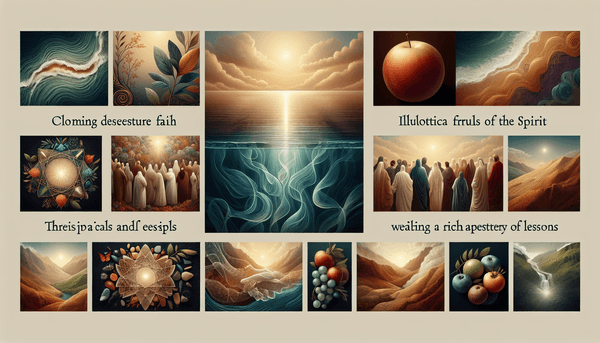The Nature of Faith
Faith is a cornerstone of the Christian life, and as Romans 10:17 states, 'So faith comes from hearing, and hearing through the word of Christ.' To become faithful, one must immerse themselves in the teachings of the Bible, which serve as the source of divine truth and guidance. Spending time in prayer, seeking the Holy Spirit's direction, and engaging with a community of believers are foundational steps in nurturing one's faith. It is through the active application of love, forgiveness, and compassion that faith becomes a living testimony to the grace of God. As we walk in faith, we are reminded of Hebrews 11:1, which describes faith as 'the assurance of things hoped for, the conviction of things not seen.' This unseen assurance propels believers to live out their convictions in tangible ways, manifesting a faith that is alive and impactful.
The Fruits of the Spirit
The Fruits of the Spirit, as listed in Galatians 5:22-23, are the evident qualities of a life governed by the Spirit of God. These fruits—love, joy, peace, patience, kindness, goodness, faithfulness, gentleness, and self-control—are not mere attributes but are transformative traits that the Holy Spirit cultivates within us. In our journey of seeking spiritual balance in the modern world, developing these fruits requires a conscious effort to abide in Christ, as Jesus himself says in John 15:5, 'I am the vine; you are the branches. Whoever abides in me and I in him, he it is that bears much fruit, for apart from me you can do nothing.' The impact of these fruits extends beyond personal growth; they enhance community life, fostering a climate where God's love is made visible and tangible.
Insights from the Book of Job
The Book of Job offers a profound look into human suffering and the search for understanding in the face of adversity. Job's lament in chapters 6 and 7 reveals a man grappling with the depths of despair and questioning the purpose of his pain. His candid expression of anguish resonates with anyone who has faced inexplicable suffering. The dialogues between Job and his friends, particularly Bildad's response in chapter 8, present a tension between the human experience of suffering and the concept of divine justice. Bildad's assertion of divine retribution, as seen in Job 8:6, challenges us to consider the complexities of righteousness and God's dealings with humanity. These chapters compel readers to wrestle with the nature of faith amidst trials and the essence of trusting in God's wisdom, even when it confounds human understanding.
Conclusion
As we conclude our journey through these rich and intricate biblical themes, we are reminded of the timelessness and applicability of Scripture in our lives. The nature of faith, the story of creation, the cultivation of spiritual fruits, and the lessons from Job's trials speak to the human experience across ages. These topics encourage us to reflect on our own spiritual walk and to seek a deeper relationship with God. They challenge us to live out our faith with integrity and embrace the spiritual wisdom that guides us to let go of negative thoughts, live righteously, and seek mercy. May this exploration serve as an invitation to delve further into the Bible, to discover its treasures, and to allow its truths to transform us from the inside out.






